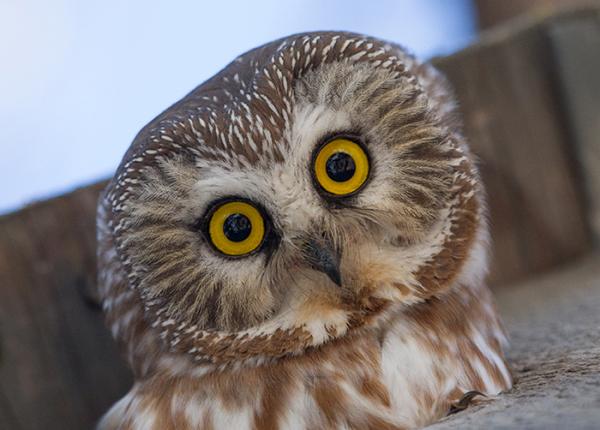Saw this post on the Glen Helen Raptor Center Facebook page while looking for today’s owl of the day and it seemed like something you guys would enjoy.
The ear-like feathers on top of many owls heads are called plumicorns and are thought to aid in camouflage and communication. Owls can raise and lower these feathers at will with tiny muscles at the base of each feather. This little screech owl rehab patient is recovering from head trauma and tends to hold just one plumicorn up at a time which begs the question:
“What do you call an owl with just one plumicorn?”


Ooo let me see if I can figure this out since I couldn’t find a pronunciation online.
Chouette is “owl,” and it sounds like sh+wet.
Is -bou the same ou sound as it is in chouette, like the e in bet?
So Choubou is schweh+beh?
I like that Choubou can also be a play on chouette!
It looks like the origin of the word is “little jackdaw,” but if chou means cute, does chouette also work as “little cute one?”
Is hiboux still used? I’ve only seen it used in the song with the cookoo. The dictionary I looked at says chouette is no plumicorns and hiboux is with them. I know the dictionary isn’t always the way people talk, especially in other places. I was watching something on world languages the other day, and it looked like more countries speak French than I thought and I’m sure they ask have their own peculiarities.
I also stumbled on this book that was about an owl:
“ou” is one sound written with two letters, it is very close to the “oo” sound in English. So the “bou !” is pretty much the same as “boo” in “peekaboo” (in french, we say "coucou ! bou ! But that’s another story.)
So choubou is prononced something like “shooboo”.
Exactly ! If you say it very slow, you’ll say “shoo + et” but in everyday speech “oo” and “e” a “w” sound is add for transition and we end up saying “sh-wet”.
My “choubou” is a mix between “chouette”, an owl without plumicorn and "hibou, an owl with plumicorns. It also remind of the french world “cute”, “chou”. Honestly, the pun not very convincing in french but I could’nt resist try to make a new french/english owl play on words.
Idk about little jackdaw. Can you elaborate ?
Yes, it is. In french " un hibou", an owl with plumicorns is considered a completely different bird that “une chouette”, an owl without plumicorn.
It is like if in a language there is no difference in the name for dog and wolf : There is a broad word for the two and then names of different species. You, as a english speaker, will still make a clear difference btw the 2 animals even though this distinction is neither obvious or natural to make to the people speaking the other language.
The author of the book write owl pun way better than I do ! “Ti” is like an informal distortion of “petit” “small”. The owl picture is clearly “un hibou” (it has plumicorns). In french, “bout” with a silent “t” means a piece of something. More figuratively, we can use this word to express the fact that children are just small version of human, small adult. So the name of the book insists on the fact that the story is about a cute baby something. Something what ? a “hibou” one sound away from “tibou”.
Ok, the pronunciation was right on my first guess, but it felt too easy for French pronunciation and I overthought it! Before my chats with you, the extent of my French experience has been learning to pronounce a few things on my one trip to New Orleans. I should have gotten it right from the owl/cookoo song.
The breakdown of how chouette is pronounced is helpful now that it’s a word I’m now at least a bit familiar with. Knowing where the ou stops and the ette starts makes much more sense now.
The etymology about the jackdaw came from Wiktionary
I know Spanish also has different words for owls with and without plumicorns, it seems English skipped that for some reason.
The book title does look to be a pun. The other creatures seem to be afraid of him because he’s a predator, sort of like a watered down Zootopia.
Thank you so much for all the explanations! It’s a lot of fun getting surprise lessons here.